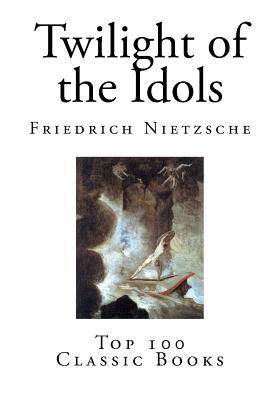
- Afhalen na 1 uur in een winkel met voorraad
- Gratis thuislevering in België vanaf € 30
- Ruim aanbod met 7 miljoen producten
- Afhalen na 1 uur in een winkel met voorraad
- Gratis thuislevering in België vanaf € 30
- Ruim aanbod met 7 miljoen producten
Zoeken
€ 15,95
+ 31 punten
Omschrijving
A Classic top 100 Book. Twilight of the Idols by Friedrich Nietzsche [ 1895 ]. Text prepared from the original German and the translations by Walter Kaufmann and R.J. Hollingdale. Twilight of the Idols, or, How to Philosophize with a Hammer is a book by Friedrich Nietzsche, written in 1888, and published in 1889. Twilight of the Idols was written in just over a week, between 26 August and 3 September 1888, while Nietzsche was on holiday in Sils-Maria. As Nietzsche's fame and popularity was spreading both inside and outside Germany, he felt that he needed a text that was a short introduction to his work; Twilight of the Idols is his attempt at this. Originally titled A Psychologist's Idleness, it was renamed Twilight of the Idols, or, How to Philosophize with a Hammer. The latter title, Gotzen-Dammerung in German, is a pun on the title of Richard Wagner's opera, Gotterdammerung, or 'Twilight of the Gods'. Gotze is a German word for "idol" or "false god". Walter Kaufmann has suggested that in his use of the word Nietzsche might be indebted to Francis Bacon. Nietzsche criticizes German culture of the day as unsophisticated and nihilistic, and shoots some disapproving arrows at key French, British, and Italian cultural figures who represent similar tendencies. In contrast to all these alleged representatives of cultural "decadence", Nietzsche applauds Caesar, Napoleon, Goethe, Thucydides and the Sophists as healthier and stronger types. The book states the transvaluation of all values as Nietzsche's final and most important project, and gives a view of antiquity wherein the Romans for once take precedence over the ancient Greeks.
Specificaties
Betrokkenen
- Auteur(s):
- Uitgeverij:
Inhoud
- Aantal bladzijden:
- 90
- Taal:
- Engels
- Reeks:
Eigenschappen
- Productcode (EAN):
- 9781500629571
- Verschijningsdatum:
- 24/07/2014
- Uitvoering:
- Paperback
- Formaat:
- Trade paperback (VS)
- Afmetingen:
- 178 mm x 254 mm
- Gewicht:
- 172 g

Alleen bij Standaard Boekhandel
+ 31 punten op je klantenkaart van Standaard Boekhandel
Beoordelingen
We publiceren alleen reviews die voldoen aan de voorwaarden voor reviews. Bekijk onze voorwaarden voor reviews.











